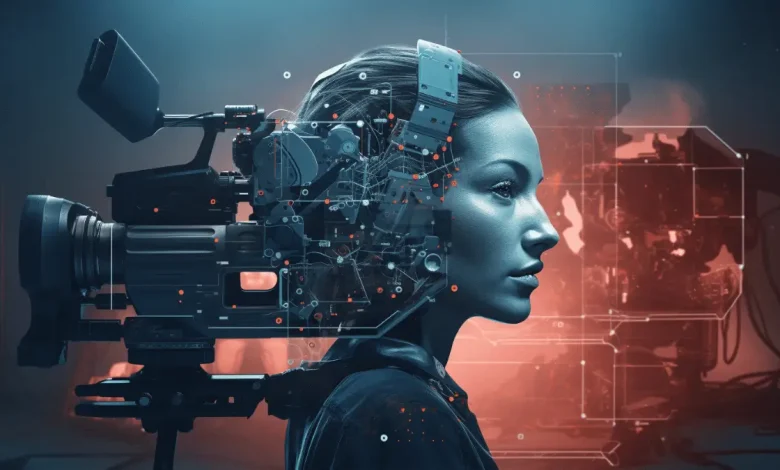Filmmaking Meets AI: Unlocking New Opportunities in the Industry

Table of contents
- AI Reshapes Story Development and Screenwriting
- Casting and Pre-Visualization Go Digital
- Filming Efficiency and Set Optimization
- AI, VFX, and CGI: Instant, Affordable, Awesome
- Editing Magic: AI Accelerates Post-Production
- Market Analysis and Audience Targeting
- Subtitles, Dubbing, and Worldwide Access
- Personalized Marketing and Social Media Buzz
- Ethics, Jobs, and the Human Touch
- The Future: AI as Creative Collaborator
Artificial intelligence (AI) is transforming filmmaking at every stage, from pre-production to post. Filmmakers now use AI to streamline workflows, cut costs, and spark creative ideas. This fusion of creativity and technology opens new doors for both emerging and established talent.
ALSO READ: 14 Websites to Download Movies for Free in 2025!
AI Reshapes Story Development and Screenwriting
AI tools now assist writers with brainstorming, script analysis, and plot structure. Screenwriters use platforms like Sudowrite and WriterDuet to refine dialogue, generate ideas, and even predict audience reactions. “AI gives me instant feedback on pacing and character arcs tools I would have killed for a decade ago,” says Johannesburg-based scriptwriter Asanda Sizakele. AI can analyze successful scripts, suggest plot twists, and tailor content for specific audiences. This technology democratizes storytelling, empowering newcomers and indie filmmakers.
Casting and Pre-Visualization Go Digital
AI speeds up casting by analyzing thousands of auditions, matching actors to roles based on facial expressions, voice, and past performances. Platforms like Casting AI and Synthesia let directors pre-visualize scenes with digital stand-ins. Directors can experiment with lighting, angles, and even virtual actors before shooting begins. “Pre-viz with AI not only saves time but sparks new creative directions,” explains Cape Town director Mbali Ndlovu. AI also forecasts how audiences might respond to different casting choices, allowing for data-driven decisions.
Filming Efficiency and Set Optimization
Drones with computer vision help scout locations, while real-time translation and on-set scheduling AI reduce miscommunication. AI-powered cameras can auto-track subjects and adjust settings instantly. “We’ve cut shoot times by 20% since using AI cameras,” says Durban cinematographer Sipho Hlatshwayo. AI also analyzes weather forecasts, safety hazards, and logistics, warning crews in real time. These innovations let directors focus on performance and vision.
AI, VFX, and CGI: Instant, Affordable, Awesome
Hollywood-grade visual effects are now within reach for smaller studios. AI transforms footage, removes green screens, and creates realistic CGI elements at a fraction of the cost. Deep learning algorithms upscale footage, color-correct automatically, and even resurrect classic films in 4K. “AI tools let us punch above our weight,” notes Cape Town VFX artist Zola Mabena. Visual effects that once took days now render in hours.
Editing Magic: AI Accelerates Post-Production
Modern editing platforms harness AI to cut dailies, sync audio, and suggest cuts. “AI helps me spot the emotional heart of a scene,” says editor Nomusa Khumalo. Tools like Descript and Adobe Premiere Pro’s Sensei analyze speech, highlight mistakes, and auto-subtitle. Automated color grading and sound mixing shave weeks off deadlines. AI-generated music and soundtracks tailor mood and tone to the director’s wishes.
Market Analysis and Audience Targeting
AI spots trends and forecasts box office success better than traditional research. Producers use predictive analytics to tweak marketing, choose release dates, and even reshoot endings. “AI found us an untapped audience for our last film,” shares producer Trevor Moloi. Streaming platforms, like Netflix and Amazon Prime, use AI to personalize recommendations and create trailers that convert.
Subtitles, Dubbing, and Worldwide Access
AI translates dialogue, generates multilingual subtitles, and voices over characters in local languages. “AI dubbing cuts costs 75% and slashes turnaround time,” says distribution manager Thandiwe Nkosi. This tech expands global reach for African films, from Nollywood to local indie projects. Subtitles now appear with minimal lag and industry-standard accuracy.
Personalized Marketing and Social Media Buzz
AI identifies micro-influencers, predicts viral moments, and crafts targeted ads. “Our campaign went viral thanks to AI-driven influencer picks,” explains marketing chief Siya Dube. AI edits behind-the-scenes clips, creates teasers, and schedules posts for maximum impact. Filmmakers now engage fans in real time, building excitement before the first screening.
Ethics, Jobs, and the Human Touch
As AI streamlines work, it raises questions about job displacement and authenticity. Some fear algorithms will homogenize stories or replace key creative roles. “AI should empower, not replace, human creativity,” insists veteran producer Linda Khumalo. Many experts emphasize reskilling and collaboration: AI handles routine tasks, freeing artists for bold, visionary work.
The Future: AI as Creative Collaborator
AI co-writers, virtual actors, and autonomous editing suites herald a new era. Filmmakers with big dreams and slim budgets now compete globally. “AI lets us tell our stories our way, faster and cheaper,” declares rising director Kagiso Letsoalo. The future of filmmaking is human talent amplified by machine intelligence narratives enriched, not diminished, by algorithms.
AI unlocks opportunities and efficiencies across the film industry from script to screen to global distribution. It cuts costs, speeds up post, and expands reach. Yet, at its core, AI is a tool for human imagination and ambition. As South Africa’s film sector embraces this tech, storytellers have new ways to shine, locally and worldwide. The marriage of filmmaking and AI is just beginning, and the creativity it enables stories told, jobs reinvented, audiences reached is boundless.


